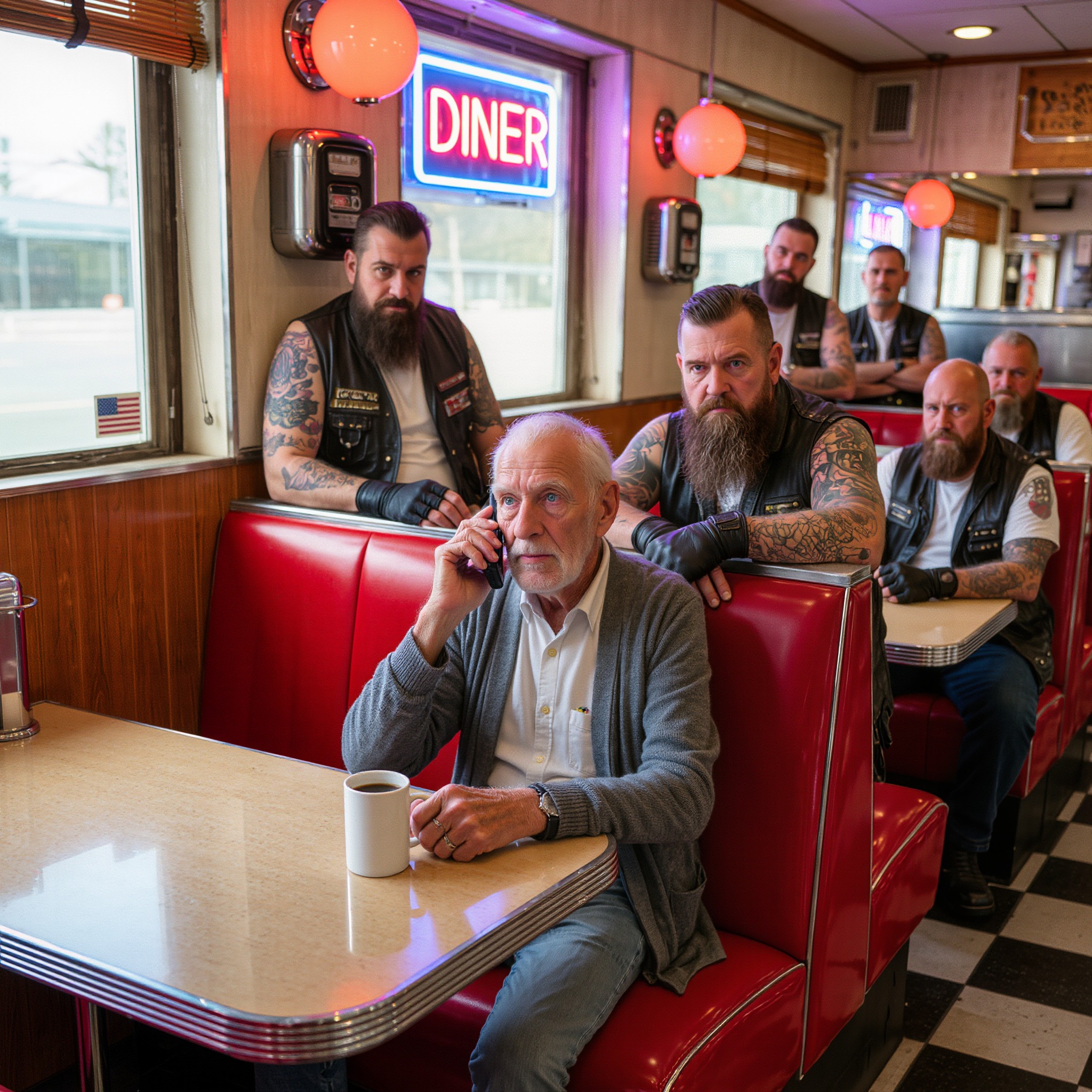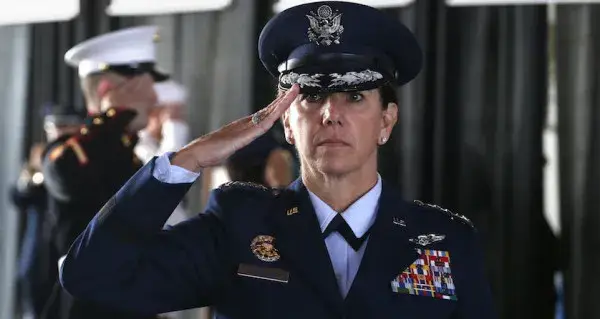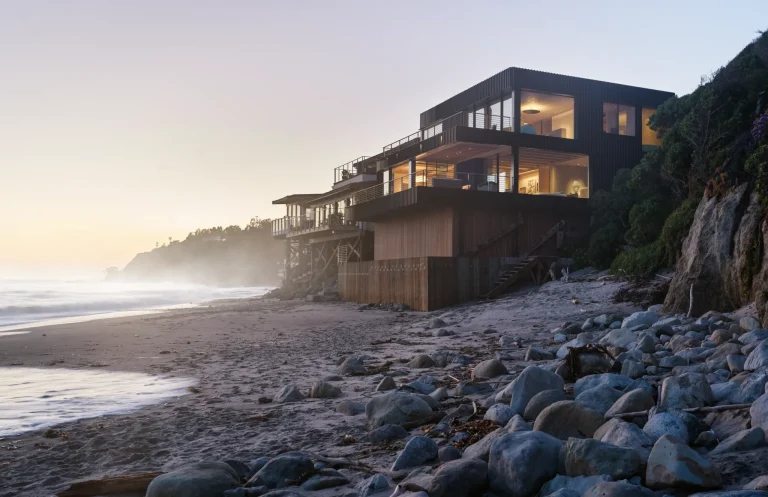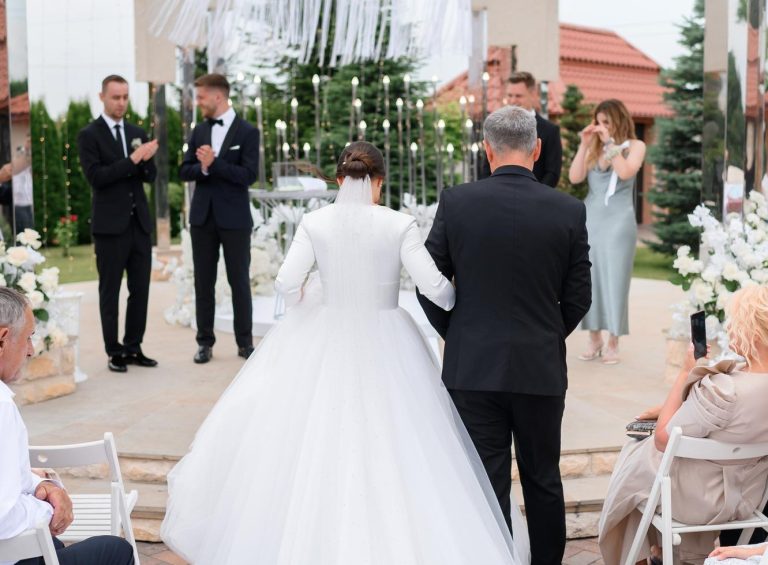96-Year-Old Veteran Destroys Biker Gang: The Legend of Iron Hands Harrison
The Quiet Man at the Diner
In the sleepy coastal town of Millbrook, Maine, 96-year-old Walter “Iron Hands” Harrison was known as just another elderly veteran enjoying his retirement. Every morning, he shuffled into Miller’s Diner for black coffee and blueberry pancakes, offering kind words to locals who saw him as nothing more than “Old Walt”—a harmless relic from another era.
What they didn’t know was that this frail-looking old man was once among the most feared hand-to-hand combat instructors in Marine Corps history. For over thirty years, Walter had trained elite special forces in survival tactics behind enemy lines. His nickname, “Iron Hands,” didn’t come from brute strength—it came from his uncanny ability to exploit any opponent’s weakness with surgical precision.
The morning everything changed started like any other. Walter sat at his usual counter seat, sipping coffee while the television murmured news about rising crime along the Maine coast. The Iron Wolves motorcycle gang had been moving steadily north, leaving trouble in their wake.
“Getting scary out there, isn’t it, Mr. Harrison?” Sally, the owner’s daughter, said while refilling his cup. “Dad’s talking about installing security cameras after what happened in Portsmouth last week.”
Walter offered a reassuring smile. “Everything has a way of working itself out, Sally. Trust me.”
His voice was soft, but carried unmistakable authority—the voice of a man who had spent his life teaching others how to face their fears.
When Trouble Rolls Into Town
The peaceful morning shattered with the aggressive rumble of approaching motorcycles. Not the disciplined purr of military bikes Walter knew well, but machines modified specifically to intimidate.
Five motorcycles pulled into the parking lot, black paint and chrome gleaming menacingly in the morning sun. The Iron Wolves had arrived in Millbrook.
Through the diner’s window, Walter watched them dismount. Their leader—a tall man with a shaved head and spiderweb tattoo creeping up his neck—surveyed the establishment with predatory confidence. The patches on their vests marked them as the gang’s “enforcement crew.”
Sally’s hand trembled as she set down the coffee pot. Other customers avoided looking outside, conversations fading to whispers. Walter remained calm, methodically cutting into his pancakes as the door swung open.
The bell’s cheerful chime felt oddly out of place as five leather-clad figures swaggered inside. The leader’s boots hit the linoleum with deliberate heaviness, brushing Walter’s shoulder as he passed.
“Nice place you got here,” the leader announced, voice carrying an implied threat. “Shame if anything happened to it.”
Walter continued eating, unhurried and precise. To casual observers, he appeared oblivious to danger. Beneath that calm exterior, decades of training were already at work—noting positions, analyzing movements, identifying the tells of people who used fear to mask their own weaknesses.
“Hey, old man,” the leader said, irritated by Walter’s lack of reaction. “You’re in my seat.”
Walter set down his fork with deliberate care. “There are plenty of empty seats, son. Why don’t you take one of those?”
The leader’s face darkened. “Maybe you don’t know who we are, Gramps. This is Iron Wolves territory now. When we want something, we take it.”
Walter turned slowly on his stool. His pale blue eyes met the leader’s gaze for just a moment—long enough that the younger man took an involuntary step back. Something in that steady stare hinted at experiences far beyond small-town intimidation.
“Son,” Walter said softly, “I’ve forgotten more about ‘territory’ than you’ll ever know. Now, why don’t you and your friends sit down, order some breakfast, and we can all start this morning over?”
The Phone Call That Changed Everything
The leader—who called himself Razor—recovered quickly, anger replacing his momentary uncertainty. “Listen here, you old fossil—”
His words stopped as Walter’s hand moved—not in attack, but reaching slowly for his phone. The motion was deliberate, almost casual, but something about it made all five bikers tense.
“A phone call, old man? Really?” Razor’s laugh was mocking. “Who you gonna call? The cops? They’re too busy to bother with us.”
Walter’s eyes flickered to the group’s positions: one by the door, two flanking the counter, one near the kitchen entrance. Decades of instruction had taught him to read body language like a book. These weren’t hardened warriors. They were bullies unused to real resistance.
“You know,” Walter said in the same calm tone he’d used to instruct countless Marines, “in all my years of teaching, I noticed something: the loudest ones—the ones who try hardest to intimidate—usually have the most to prove.”
One of Razor’s men, a heavily tattooed figure they called Wrench, stepped forward. “You taught combat? That’s rich. What’d you teach, old timer—how to use a walker as a weapon?”
Sally spoke up with trembling courage. “You don’t know who he is—Mr. Harrison—”
“Quiet, Sally,” Walter said gently. “These boys aren’t interested in history lessons.” He turned back to Razor. “Son, I’m going to give you one more chance to walk away—not for your sake, but for theirs.”
The diner had gone so quiet you could hear the bacon sizzle. Razor grabbed Walter’s shoulder, fingers digging into the old man’s jacket.
“Listen here, you—”
Before he could finish, Walter’s free hand moved. It wasn’t dramatic—just a precise adjustment of Razor’s grip—and suddenly the younger man felt a bolt of pain shoot up his arm. He tried to pull away; the pain increased.
“That’s your radial nerve,” Walter explained calmly, as if giving a classroom demonstration. “The human body has exactly 728 pressure points. During my years teaching for the Marine Corps, I showed thousands how to find every single one.”
Razor’s face went from red to pale. The others shifted, thrown off by the sudden turn. Walter released him, and Razor stumbled back, rubbing his hand.
“Now,” Walter continued, “about that phone call.” His fingers moved over the keypad with deliberate precision. “You ever hear of Force Recon? Marine special operations? I spent decades training their instructors. And here’s something interesting about Marines: we keep in touch.”
One of the younger bikers swallowed hard. “Razor… maybe we should—”
“You think I’m scared of some old man’s stories?” Razor snarled, though doubt had crept into his voice.
“You shouldn’t be scared of my stories,” Walter said, eyes cool. “You should be concerned about who I’m calling. There are three dozen retired Force Recon Marines living within twenty miles of Millbrook—men I personally trained—men who’ve been looking for a worthy cause to keep their skills sharp.”
The phone began to ring. Through the window, motorcycles appeared in the distance. These weren’t flashy machines—the riders moved in disciplined formations that spoke of military precision.
“Last chance, boys,” Walter said softly. “Sit down, order breakfast, and we can start over. Or stay and explain yourselves to some very motivated Marines who’ve been eager for a refresher on close-quarters combat skills.”
The youngest member was already edging toward the door. Even Wrench looked uncertain. Only Razor remained defiant, his face taking on a sickly pallor.
The call connected. A gruff voice answered. “Spider Murphy here. That you, Iron Hands?”
Walter smiled. “Spider, remember that refresher course we discussed? I think I’ve found volunteers.”
The Cavalry Arrives
The atmosphere in Miller’s Diner shifted dramatically with Spider Murphy’s voice on the line. Walter kept his gaze locked on Razor while he spoke.
“We’ve got five eager students at Miller’s Diner. Thought you might share some of those techniques we developed for the Corps.”
“You sure about this?” Spider asked, his voice clearly audible to everyone. “These wouldn’t happen to be those Iron Wolves causing trouble up and down the coast?” Anticipation edged his tone.
“The very same,” Walter confirmed, measured and professional. “They seem interested in the concept of territory control. Thought we might offer a practical demonstration.”
Through the windows, the approaching motorcycles drew closer, maintaining perfect military spacing. These weren’t weekend riders—their discipline spoke of years of service and countless operations.
Razor tried to laugh, but it came out weak. “You think we’re scared of some old military has-beens? We’ve dealt with tough guys before.”
Walter’s expression didn’t change, but his eyes hardened. “Spider, remember that joint operation back in ’83? The one where we neutralized a dozen hostile fighters using only hand techniques?”
“How could I forget?” Spider replied. “The after-action report called those moves ‘physically impossible.’ But we both know better.”
“You see, boys,” Walter said evenly, “there’s a difference between fighting and combat. Fighting happens in bars and back alleys. Combat is what happens when trained professionals decide to solve a problem—permanently and lawfully.”
Outside, the first retired Marines pulled into the parking lot. They dismounted with fluid precision—men in their fifties and sixties who still moved with unmistakable purpose. Several wore faded Force Recon tattoos, badges of honor from decades of service.
The youngest biker broke first, practically running for his motorcycle. Wrench followed, swagger completely gone. The remaining men looked to Razor for permission to retreat.
“This isn’t over, old man,” Razor managed, his voice cracking.
“Actually, son,” Walter replied calmly, “it is. Even if you leave now, these men know your faces and your bikes. They’re not just retired Marines—they’re patriots who remember what it means to protect their communities.”
Spider Murphy entered first—a weathered veteran with salt-and-pepper hair and the bearing of a career soldier—followed by two other Marines. Their entrance was silent, efficient, coordinated.
“Morning, Iron Hands,” Spider said, using Walter’s old call sign with deep respect. “These the students you mentioned?”
Walter nodded. “They expressed interest in territory control. Thought you might explain some finer points.”
More retired Marines filtered in, moving with synchronized discipline. Each man carried quiet confidence born of proven capability rather than empty bluster.
The Lesson in True Strength
“You know,” Spider said, moving closer to Razor with measured deliberation, “there’s something people misunderstand about territory. It isn’t about who’s loudest. It’s about who has the skill, discipline, and commitment to maintain it.”
The parking lot had transformed into a reunion of decorated veterans—former Force Recon operators, combat instructors, and specialists—many of whom had learned their craft directly under Walter’s tutelage.
Sally watched in amazement. These weren’t stereotypes of elderly soldiers living in the past. They had maintained their edge, their training, and their sense of purpose.
“Mr. Harrison,” she said softly, “I had no idea.”
“There’s a lot of history here, Sally,” Walter replied. “More than most would believe.”
Spider examined the patches on Razor’s vest with professional interest. “Custom work. Interesting though—this symbol you’re using? It’s a modified version of a Force Recon insignia. Which means you’re not just intimidating civilians—you’re borrowing honors you haven’t earned.”
The atmosphere had shifted completely. What started as attempted intimidation had turned into a master class in true strength and authority.
“Here’s what’s going to happen,” Walter said in the same instructional tone he’d used to train countless Marines. “You’re going to leave Millbrook and not come back. But more than that, you’re going to spread the word along the coast about what happened here today.”
“And just so there’s no misunderstanding,” Spider added, “every veteran here has memorized your faces, your tattoos, and your bike configurations. We’ve got friends in every coastal town from here to Portsmouth—real veterans, not pretenders wearing borrowed symbols.”
Morning light illuminated the stark contrast: the Iron Wolves, their manufactured toughness crumbling under real pressure, and the veterans, radiating quiet confidence born of actual experience and discipline.
“One more thing,” Walter said, holding up his phone. “If I could handle one of you with two fingers, imagine what a room full of trained professionals could do if you make the mistake of returning.”
The message was clear—delivered not with threats, but with calm certainty that carried far more weight than any bluster.
The Iron Wolves’ choices had narrowed to one: leave immediately. Their departure lacked any of the intimidation they’d hoped to project, engines roaring as they fled the parking lot.
The Aftermath
As the bikers’ engines faded into the distance, Miller’s Diner transformed into an impromptu command center. Retired Marines gathered around Walter, their respect and camaraderie evident in every interaction.
“They’ll be back,” Walter said quietly, drawing on decades of tactical assessment. “Not today, maybe not tomorrow—but wounded pride festers. We need to be ready.”
What followed wasn’t just protection for Millbrook—it was the birth of something larger. Walter and the veterans created what would become known as the Millbrook Protocol, a comprehensive community defense network that would eventually spread to dozens of coastal towns.
Over the following weeks, the Iron Wolves did attempt to return, bringing reinforcements and hired muscle. But each time, they found themselves facing not just Walter and his immediate circle, but a growing network of veterans and community members who had rediscovered their own strength.
The confrontations weren’t violent—they didn’t need to be. The mere presence of disciplined, purposeful men who knew exactly what they were capable of proved more effective than any physical force.
Many of the gang’s hired contractors, facing men who had once been their instructors or fellow operators, chose to walk away. Some even switched sides, finding redemption in protecting communities rather than terrorizing them.
Legacy of Iron Hands
One year later, Walter sat in his usual booth at Miller’s Diner, now renovated and expanded to accommodate regular veteran gatherings. At ninety-seven, he still possessed the sharp awareness that had made him legendary.
“Hard to believe it’s been a year,” Spider said, sliding into the seat across from him.
The transformation was remarkable. Crime along the Maine coast had dropped by eighty percent. More than thirty communities had established veteran protection programs modeled on the Millbrook Protocol. Former gang members and contractors who had found their way back to honor were now teaching legitimate security operations.
“The real success,” Walter said, watching through the window as a community patrol passed by—veterans and civilian volunteers working together, “isn’t just security. It’s redemption. It’s showing people that it’s never too late to remember who you’re meant to be.”
The diner door chimed as new visitors arrived—veterans from other states, drawn by Millbrook’s reputation. The town had become a training center, teaching not just tactics but the deeper principles of protection and service.
Sally approached with coffee. “The community college wants to know if you’ll speak again. They say your lectures on community-based defense are reshaping their entire program.”
Walter smiled quietly. At ninety-seven, he had taken on one final mission and built something that would outlast him—a model for turning potential adversaries into allies, for transforming people searching for purpose into guardians of their communities.
“You know what impresses me most?” Colonel Davidson said, joining them at the table. “It’s how this changed the way people see veterans. We’re not just telling stories about the past—we’re vital to the present.”
Through the window, the morning sun cast long shadows across Millbrook’s peaceful streets. In the parking lot, motorcycles sat in neat rows—not the menacing machines of the Iron Wolves, but the well-maintained bikes of men who had never forgotten their oath to protect and serve.
“The greatest victory,” Walter said, looking out at the community he had helped transform, “isn’t winning a fight—it’s preventing one. It’s showing others a better path. It’s remembering that every person—no matter how far they’ve strayed—carries the potential for honor, for service, for redemption.”
The lesson Walter “Iron Hands” Harrison taught that morning in a small Maine diner rippled far beyond Millbrook’s borders. It wasn’t about an old man defeating young punks. It was about the enduring power of discipline, the strength of community, and the truth that real warriors protect rather than destroy.
In the end, the story of Millbrook became a reminder: never judge a book by its cover, never underestimate quiet strength, and never forget that true power lies not in the ability to harm, but in the courage to protect, unite, and transform.
The legend of Iron Hands Harrison lives on—not in tales of violence, but in communities made stronger, lives redirected toward purpose, and the simple truth that it’s never too late to stand up for what’s right.

Emily Johnson is a critically acclaimed essayist and novelist known for her thought-provoking works centered on feminism, women’s rights, and modern relationships. Born and raised in Portland, Oregon, Emily grew up with a deep love of books, often spending her afternoons at her local library. She went on to study literature and gender studies at UCLA, where she became deeply involved in activism and began publishing essays in campus journals. Her debut essay collection, Voices Unbound, struck a chord with readers nationwide for its fearless exploration of gender dynamics, identity, and the challenges faced by women in contemporary society. Emily later transitioned into fiction, writing novels that balance compelling storytelling with social commentary. Her protagonists are often strong, multidimensional women navigating love, ambition, and the struggles of everyday life, making her a favorite among readers who crave authentic, relatable narratives. Critics praise her ability to merge personal intimacy with universal themes. Off the page, Emily is an advocate for women in publishing, leading workshops that encourage young female writers to embrace their voices. She lives in Seattle with her partner and two rescue cats, where she continues to write, teach, and inspire a new generation of storytellers.









